QuestionThank you for reading my question. I have a neutered, DSH, male, cat about 9 or 10. I adopted him from a shelter when he was about 3 or 4 and was told that he was a talker. And he is a litte more vocal than some overall. Most of the time his talking is just fine but starting about 2pm every day he starts to meow incessantly until I feed him at 5pm. The same behavior begins again about 9:30 or 10:00 pm and lasts until I feed him again 11pm. He has been on this same schedule with the same amount of vet recommended food (Science Diet WD wet and dry) for years and years. He has been meowing like this for years and years also. I have tried everything I can think of including squirting him, putting him in another room, and simply feeding him early but often, within 10 or 15 minutes, he seems to forget that he's been fed and starts the meowing again. He's extremely persistent. I am at my wit's end and am tempted to feed him on demand but he's already slightly overweight and my husband thinks he will just eat all the food all the time. The vet doesn't think this will work either and thinks he may be bored. We've gotten him new toys and interacted with him more but that's not it. He's a very affectionate cat who is quite attached to me. He wants to be a good cat but he truly does not understand that the mewowing is objectionable. In all other areas his behavior is excellent. Any insight you can provide would be most appreciated.
AnswerChristie,
Since Science Diet WD is a higher fiber weight control food I'm wondering if the constant demands for food are a result of your kitty not getting his nutritional needs met. Cats are obligate carnivores and they need meat protein to make up the majority of their diet in order to be healthy and happy. I understand that Science Diet WD is a prescription food recommended by your veterinarian, however I'm wondering if your kitty has any other health concerns beyond his weight. If being slightly overweight is the only health issue I'd recommend that you consider changing his diet. Your veterinarian may not be entirely happy if you do opt to change your cat's diet, just remember that your vet gets a commission from the sales of prescription food and s/he also gets paid if your cat becomes ill. Unfortunately weight control foods like WD tend to be higher in fiber and vegetable proteins which cats don't digest all that well and consequently the ingredients really don't meet a cat's nutritional needs. There is a growing trend towards a more holistic approach to all aspects of pet care from grooming and training to diet and health care and speaking from experience I can tell you it works. My vet is a holistic practitioner who uses conventional medicine when warranted, she also uses homeopathy when conventional medicine doesn't provide the whole solution. You may find that changing your kitty's diet to a higher quality holistic food means that he can eat less to satisfy himself and you can control his food intake by measuring out his portion first thing in the morning. I'm thinking that a change in diet should help to make your kitty less vocal around feeding times if he's more satisfied after eating.
In the past I was quite comfortable feeding the so called premium pet foods including Science Diet, but I have to admit that the last year or so has been quite educational. During the Menu Foods fiasco I nearly lost my eldest cat to kidney failure. After we got the initial blood results back from the emergency clinic I was informed by the veterinarian that it would be kindest to euthanize my little girl, MC. The following morning my veterinarian stabilized my baby and placed her in the hospital cage. Later that afternoon another set of blood results came back and the other vet in the practice called me and recommended that I keep considering euthanasia if MC's blood values didn't improve. I truly thought that I had been feeding a high quality food and I was devastated to learn that I may have actually caused my little girl's kidneys to fail just by feeding her tainted food. Thankfully with more fluids and hospital care MC rebounded and her kidney values were normal when she left the hospital a few days later. As part of the discharge instructions I was told that I would have to feed a low protein prescription food and administer subcutaneous fluids on an as needed basis for the rest of MC's life. As soon as MC got home from the hospital she informed me that she wouldn't eat the low protein diet no matter how much I begged, pleaded and tried to convince her that the food was palatable so I called the vet and I was told to go ahead and force fed her. I got to the point where I couldn't handle my baby girl running away from me every time I went to pick her up so I decided that I would find a safe, healthy, high quality food she could eat what she wanted. Ultimately MC's story has a happy ending, her kidney function has recovered and my vet has been helping me to wean my little girl off of daily fluids. Today MC only occasionally needs supplemental fluids, my vet suspects that she will entirely recover and no longer need any special care in time.
Throughout the time I was researching foods and trying to find out what was best for my cats I became totally disillusioned with the pet food industry in general. I went to my veterinarian with this dilemma and she recommended that I check out a website written by a veterinarian on the subject of cat care and appropriate feeding for these little carnivores. The web address is catinfo.org and I'm sure you'll find it informative. If you aren't entirely comfortable with feeding the diet suggested by the veterinarian who created catinfo.org there are a few high quality holistic foods that are commercially available. Wellness is a brand that is fairly high quality and contains only human grade ingredients, however it can be a bit costly because the manufacturer recommends that you feed a mix of wet and dry food, however if that's what your cat likes and you are completely comfortable with the idea you may want to try this out. Another high quality food is Spot's Stew by Halo, I actually feed a combination of Spot's Stew Sensitive Cat by Halo canned and dry along with the occasional meal of high quality cuts of raw organic chicken, lamb, turkey, rabbit or venison. The ingredient list for Spot's Stew Sensitive Cat is as follows: Turkey, Pea Protein, Whole Dried Eggs, Oats, Pearled Barley, Pea Flour, Turkey Liver, Salmon, Flaxseed, Salmon Oil, Pea Fiber, Sweet Potatoes, Apples, Blueberries, Green Beans, Carrots, Cranberries, Zucchini, Alfalfa, Inulin, Calcium Sulfate, Potassium Chloride, Taurine, Salt, Folic Acid, Zinc Proteinate, Iron Proteinate, Cobalt Proteinate, Copper Proteinate, Manganese Proteinate, Vitamin A Supplement, Vitamin D3 Supplement, Vitamin E Supplement, Choline Bitartrate, Niacin, Pantothenic Acid, Ascorbic Acid, Ribflavin Supplement, Thiamine Mononitrate, Pyridoxine Hydrochloride, Biotin, Lactobacillus Acidophilus, Bifidobacterium Longum, Enterococcus Faecium, Lactobacillus Plantarum, Calcium Iodate, Sodium Selenite.
I would urge you to compare this ingredient list to the Science Diet WD ingredient list and do your research. You have to come to conclusions that allow you to be completely comfortable with the diet you choose to feed your cat. Ultimately I believe that the right diet for cats lies somewhere between what vets recommend and the raw food diets that are gaining in popularity. When I don't have time to prepare a properly balanced raw food meal for my cats I feed them Spot's Stew canned or dry, and I feel completely confident that their nutritional needs are being met. There are good and bad points to consider when making any decision. Firstly your veterinarian probably gets a commission from the sales of Science Diet WD in his clinic, this may mean that s/he will try to convince you to stick with the Science Diet. I recommend that you take the time and do your own research about the pet food industry and it's many dirty secrets and try to decide what's best for your cat based on information solidly based on facts. Cats are obligate carnivores so they need meat to meet their nutritional needs, corn, rendered meats and other grains just don't satisfy the hunger gap for a cat. Higher quality foods will help to create a healthier, softer hair coat and even decrease problems with dry, itchy skin. Feeding a higher quality food is also helpful when it comes to naturally reducing your kitty's weight because he will need to eat less in order to satisfy his nutritional requirements. You can also look forward to being rewarded with less litter box odor and fewer deposits to the litter box because your cat is using more of the food that he's taking in. I'd be interested in hearing what you decide to do and whether or not it changes your kitty's excessive demands for food. If changing this little guy's diet doesn't work you may want to consider seeking the advice of a holistic veterinarian - a vet trained in conventional medicine as well as one or more alternative therapies like homeopathy, acupuncture or even massage. I highly recommend making use of holistic medicine, I've seen amazing results in cats with medical, behavioral and psychological issues.

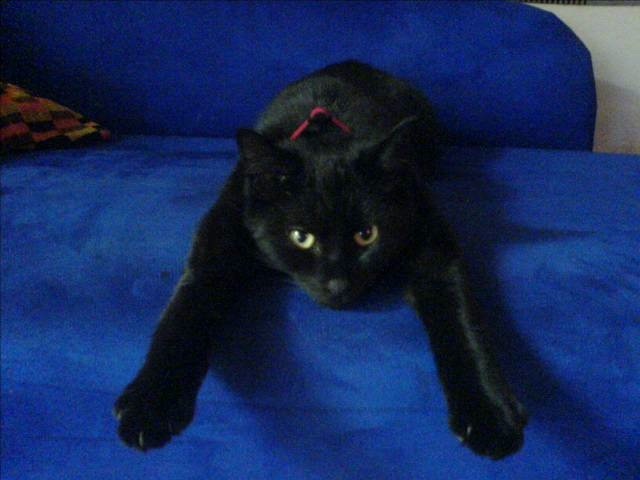 Strange litter tray behaviour
Question
Edgar
I have a beautiful two year old n
Strange litter tray behaviour
Question
Edgar
I have a beautiful two year old n
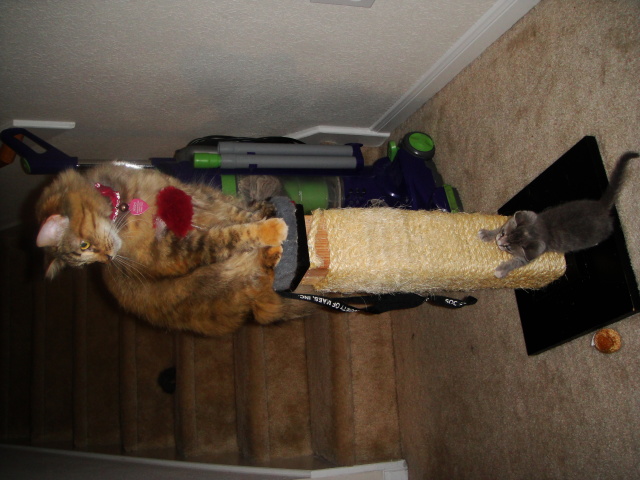 Kitten weaning questions
QuestionI just recently rescued a kitten of about 4 wee
Kitten weaning questions
QuestionI just recently rescued a kitten of about 4 wee
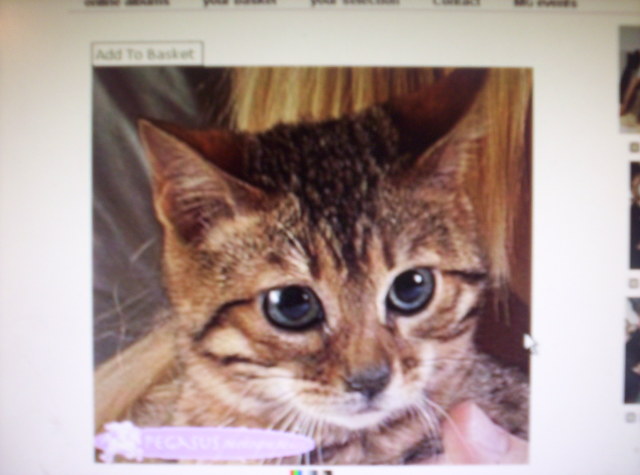 tatty kitten
QuestionQUESTION: Hi i have adopted a bengal kitt
tatty kitten
QuestionQUESTION: Hi i have adopted a bengal kitt
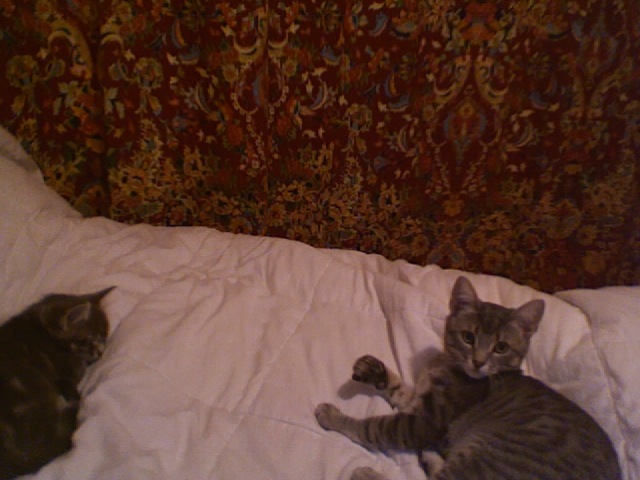 Kitten introduction
Question
the brothers
I recently (yesterday) int
Kitten introduction
Question
the brothers
I recently (yesterday) int
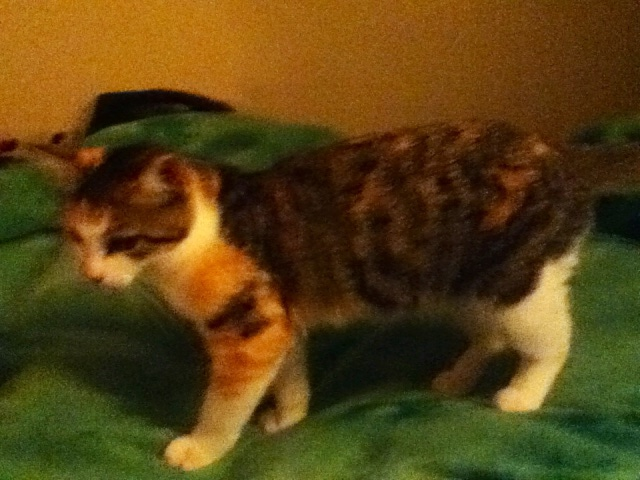 Short Tailed Manx Kitten
Question
Una Mica Una Mica
Hello,
I go
Short Tailed Manx Kitten
Question
Una Mica Una Mica
Hello,
I go